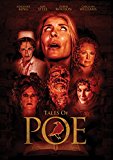| Reviews & Columns |
|
Reviews DVD TV on DVD Blu-ray 4K UHD International DVDs In Theaters Reviews by Studio Video Games Features Collector Series DVDs Easter Egg Database Interviews DVD Talk Radio Feature Articles Columns Anime Talk DVD Savant Horror DVDs The M.O.D. Squad Art House HD Talk Silent DVD
|
DVD Talk Forum |
|
|
| Resources |
|
DVD Price Search Customer Service #'s RCE Info Links |
|
Columns
|
|
|
Tales Of Poe
Wild Eye // Unrated // October 11, 2016
List Price: $13.99 [Buy now and save at Amazon]
The Film:
Horror anthologies can be tough to evaluate, leaving one to ponder whether the individual stories should have cohesive elements or whether the whole production should even be critiqued as a complete work. Flicks like Trick-or-Treat are, of course, easier to figure out since they're tied together by something as unifying as the Halloween season, let alone that each one mildly intersects with the other in some way. Then there are those like Three … Extremes, which are cleanly divided into disparate stories that share no connections and tap into different styles of horror. Bart Mastronardi and Alan Rowe Kelly's Tales of Poe appears as if it might fit more into the category of unified anthologies since the three stories all derive inspiration from the moody, gothic writings of Edgar Allan Poe, but the ways in which they veer from his iconic works in both text and tone lean it more toward being detached from one another, with the only common trait being that they're all unsuccessfully bizarre and overlong.
Two of the three stories in Tales of Poe adapt from the author's more iconic works, yet offers significant modifications to the narratives to help them become their own thing. "The Tell-Tale Heart" once again illustrates a person discussing the nature of their sanity following a murder they committed, but the genders have been flipped and the "narrator" of the macabre story has been given a profession -- a nurse caring for an elderly Norma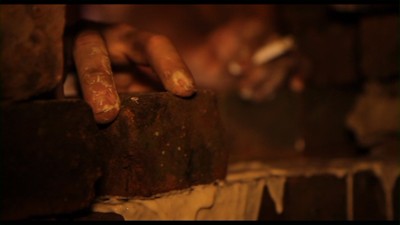 Desmond-esque silent film legend -- as the telling takes place in a mental asylum. "The Cask", which removes the Amontillado from Poe's title, transforms the narrative from strictly being about rivals in dank cellars to a depiction of a small-scale wedding, adding extra layers to the deceit that's to come. "Dreams", on the other hand, is an entirely new creation which borrows thematic influence from Poe's poem, focused on a young woman in critical medical condition who gets swept up in a surreal and metaphorical realm in her feverish slumber.
Desmond-esque silent film legend -- as the telling takes place in a mental asylum. "The Cask", which removes the Amontillado from Poe's title, transforms the narrative from strictly being about rivals in dank cellars to a depiction of a small-scale wedding, adding extra layers to the deceit that's to come. "Dreams", on the other hand, is an entirely new creation which borrows thematic influence from Poe's poem, focused on a young woman in critical medical condition who gets swept up in a surreal and metaphorical realm in her feverish slumber.
With the vignettes separated by chapter title cards, Tales of Poe operates a bit like flipping through one of those large complete-edition tomes featuring Edgar Allan Poe's works, each capped off with a distinguishing conclusion that amplifies the sensations of the horror that came before it. There's a degree of indie-budget uniformity to their visual styles that make the experience seem connective on the surface, encouraging the viewer to watch each one in succession. Thing is, the three vignettes end up occupying just under two hours, making each about 40 minutes in length, and the material covered within all of ‘em doesn't have the longevity to properly fill out the timespan. To accommodate, all three stories end up with a significant amount of bluntly macabre, repetitive padding featuring credible turns from some of indie-horror's notable scream queens, yet that shifts the mood from the kind of gut-wrenching, atmospheric eeriness one expects of a Poe story to overly explicit garishness and redundant dramatic extensions. Thus, the incremental growth of suspense suffers.
The changes that Tales of Poe elects to make to Edgar Allan Poe's work also bring into question the anthology's objectives: should these vignettes be viewed as homage-filled adaptations of the author, or as entirely new creations that so happen to mirror his plot frameworks? In "The Tell-Tale Heart", the motives of the narrator telling their story have been twisted, swapping out the intriguing mental space of a psychotic in denial with a mental patient divulging their personal experiences to others as confirmation of their illness. Likewise, "The Cask" trades the petty, interpretive pursuits of revenge found in Poe's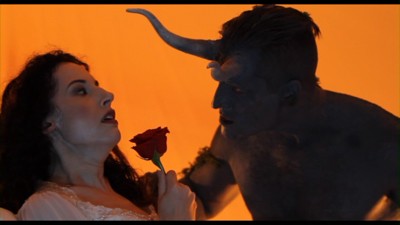 short for more tangible motivations and a love triangle. Changes happen when adapting literature to the big screen, yet certain facets of this pair of stories -- both the actual developments in the story and the themes expressed -- get lost in translation here, raising questions the more the expand on the text. Similarities to Poe's work, in the ominous tension and grueling themes, are skin-deep.
short for more tangible motivations and a love triangle. Changes happen when adapting literature to the big screen, yet certain facets of this pair of stories -- both the actual developments in the story and the themes expressed -- get lost in translation here, raising questions the more the expand on the text. Similarities to Poe's work, in the ominous tension and grueling themes, are skin-deep.
"Dreams", of course, has the freedom to act as its own piece of work, merely inspired by Edgar Allan Poe's writings -- notably Poe's poem of the same name -- instead of directly taken from them. A largely silent affair aside from the voice-over recital of the poem itself, the final chapter traverses the dreamscape of a young ill woman, and the hypnotic visual imagery on display is to be commended, incorporating in its observations the skulls of animals and test tubes, a haunting tap-dancing mute with an enigmatic desire, and a reality-distorting costume ball. One can search for deeper meaning in the visions, but individual, unguided interpretation plays a big part of the imagery, hinged on the overarching reflections it offers on the consolations and realizations of death. It's a stretch to connect "Dreams" to the works of Edgar Allan Poe, but the lyricism on display -- indulgent as it may be -- makes for a sporadically intriguing forty-five minutes of staged, quasi-meaningful ambiguity.
The DVD:
Video and Audio:
The digital photography of Tales of Poe exhibits the tell-tale signs of independent cinematography, showcasing the candidness and clarity of budget-conscious digital footage. The 1.85:1-framed transfer relishes opportunities across the board for vivid and atmospheric shades of color: ruby-red lipstick and sterile greens and tans in "Tell-Tale Heart"; neon-infused lights and shadowy bricks in "The Cask"; multihued fluids, boldly colored garments, and oranges and yellows in both translucent drapes and lightbulb filaments in "Dreams". Skin tones are warm or cool as the setting requires, with gradation that looks nice depending on the paleness or strength of the actor's complexion. Digital smoothness and noise crop up in many different scenes of varying light temperatures, but other scenes featuring blood spatter and textured masks reveal the other side of the discs. It's a mixed bag for the indie film, but it functions.
The Dolby Digital 2.0 track is equally as perfunctory, preserving the film's atmospheric intentions in ways that are both noteworthy and forgettable. Dialogue remains discernible throughout, especially during the overarching voiceovers, while other scenes that take place in specific environments -- cramped bedrooms and echoic wine cellars -- respond to the confines with plenty of responsive personality. There are some pretty fierce sound effects, too, from the ripping of flesh to the fierce thump of tap-dancing feet, which hit the mid-range clarity and lower-end support bass fairly well. No harsh distortion or hiccups to report, just a front-loaded presentation.
Special Features:
Extras include exactly ten minutes of raw Behind the Scenes (10:00, 16x9) footage that bounces between scenes from "The Cask" and "Dreams", as well as a series of Deleted Scenes (11:16, 16x9) and a short audio-only Interview with Bart Mastronardi (5:45, 16x9) accompanied by stills from the production. A Kickstarter Campaign Trailer (4:09, 16x9) and Original Trailer (2:17, 16x9 HD) have also been included.
Final Thoughts:
Other short screen adaptations of Edgar Allan Poe's works -- such as Jules Dassin's Tell-Tale Heart and the American Masters version of "The Cask of Amontillado", starring John Heard -- are worth seeking out and relishing before flipping through the Tales of Poe, an indie anthology project featuring modified adaptations of the author's material. As they appear here, the tweaks in story and tone render slightly macabre, yet unconvincing and frustrating reimagining of the material, where additions drain the stories of some of their mystique and straightforward effectiveness. The performances might be sturdy and clever in spots, but it's not enough to overcome the oddities of these homages, which also lack immersive atmosphere and genuine scares. Barely worth a Rental for its indie gumption, off-and-on performances, and plucky production design.
Thomas Spurlin, Staff Reviewer -- DVDTalk Reviews | Personal Blog/Site
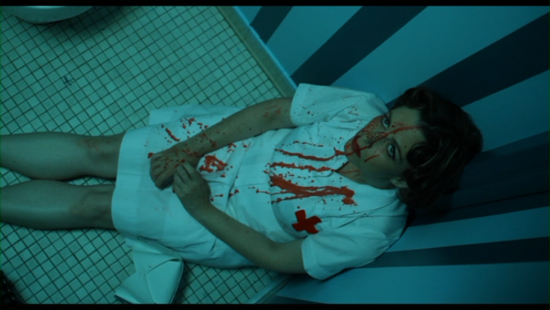 |
Horror anthologies can be tough to evaluate, leaving one to ponder whether the individual stories should have cohesive elements or whether the whole production should even be critiqued as a complete work. Flicks like Trick-or-Treat are, of course, easier to figure out since they're tied together by something as unifying as the Halloween season, let alone that each one mildly intersects with the other in some way. Then there are those like Three … Extremes, which are cleanly divided into disparate stories that share no connections and tap into different styles of horror. Bart Mastronardi and Alan Rowe Kelly's Tales of Poe appears as if it might fit more into the category of unified anthologies since the three stories all derive inspiration from the moody, gothic writings of Edgar Allan Poe, but the ways in which they veer from his iconic works in both text and tone lean it more toward being detached from one another, with the only common trait being that they're all unsuccessfully bizarre and overlong.
Two of the three stories in Tales of Poe adapt from the author's more iconic works, yet offers significant modifications to the narratives to help them become their own thing. "The Tell-Tale Heart" once again illustrates a person discussing the nature of their sanity following a murder they committed, but the genders have been flipped and the "narrator" of the macabre story has been given a profession -- a nurse caring for an elderly Norma
 Desmond-esque silent film legend -- as the telling takes place in a mental asylum. "The Cask", which removes the Amontillado from Poe's title, transforms the narrative from strictly being about rivals in dank cellars to a depiction of a small-scale wedding, adding extra layers to the deceit that's to come. "Dreams", on the other hand, is an entirely new creation which borrows thematic influence from Poe's poem, focused on a young woman in critical medical condition who gets swept up in a surreal and metaphorical realm in her feverish slumber.
Desmond-esque silent film legend -- as the telling takes place in a mental asylum. "The Cask", which removes the Amontillado from Poe's title, transforms the narrative from strictly being about rivals in dank cellars to a depiction of a small-scale wedding, adding extra layers to the deceit that's to come. "Dreams", on the other hand, is an entirely new creation which borrows thematic influence from Poe's poem, focused on a young woman in critical medical condition who gets swept up in a surreal and metaphorical realm in her feverish slumber. With the vignettes separated by chapter title cards, Tales of Poe operates a bit like flipping through one of those large complete-edition tomes featuring Edgar Allan Poe's works, each capped off with a distinguishing conclusion that amplifies the sensations of the horror that came before it. There's a degree of indie-budget uniformity to their visual styles that make the experience seem connective on the surface, encouraging the viewer to watch each one in succession. Thing is, the three vignettes end up occupying just under two hours, making each about 40 minutes in length, and the material covered within all of ‘em doesn't have the longevity to properly fill out the timespan. To accommodate, all three stories end up with a significant amount of bluntly macabre, repetitive padding featuring credible turns from some of indie-horror's notable scream queens, yet that shifts the mood from the kind of gut-wrenching, atmospheric eeriness one expects of a Poe story to overly explicit garishness and redundant dramatic extensions. Thus, the incremental growth of suspense suffers.
The changes that Tales of Poe elects to make to Edgar Allan Poe's work also bring into question the anthology's objectives: should these vignettes be viewed as homage-filled adaptations of the author, or as entirely new creations that so happen to mirror his plot frameworks? In "The Tell-Tale Heart", the motives of the narrator telling their story have been twisted, swapping out the intriguing mental space of a psychotic in denial with a mental patient divulging their personal experiences to others as confirmation of their illness. Likewise, "The Cask" trades the petty, interpretive pursuits of revenge found in Poe's
 short for more tangible motivations and a love triangle. Changes happen when adapting literature to the big screen, yet certain facets of this pair of stories -- both the actual developments in the story and the themes expressed -- get lost in translation here, raising questions the more the expand on the text. Similarities to Poe's work, in the ominous tension and grueling themes, are skin-deep.
short for more tangible motivations and a love triangle. Changes happen when adapting literature to the big screen, yet certain facets of this pair of stories -- both the actual developments in the story and the themes expressed -- get lost in translation here, raising questions the more the expand on the text. Similarities to Poe's work, in the ominous tension and grueling themes, are skin-deep. "Dreams", of course, has the freedom to act as its own piece of work, merely inspired by Edgar Allan Poe's writings -- notably Poe's poem of the same name -- instead of directly taken from them. A largely silent affair aside from the voice-over recital of the poem itself, the final chapter traverses the dreamscape of a young ill woman, and the hypnotic visual imagery on display is to be commended, incorporating in its observations the skulls of animals and test tubes, a haunting tap-dancing mute with an enigmatic desire, and a reality-distorting costume ball. One can search for deeper meaning in the visions, but individual, unguided interpretation plays a big part of the imagery, hinged on the overarching reflections it offers on the consolations and realizations of death. It's a stretch to connect "Dreams" to the works of Edgar Allan Poe, but the lyricism on display -- indulgent as it may be -- makes for a sporadically intriguing forty-five minutes of staged, quasi-meaningful ambiguity.
The DVD:
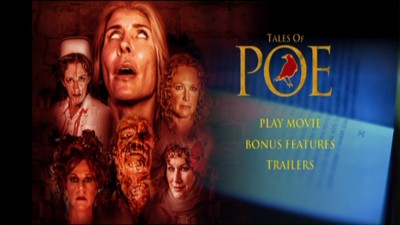 | 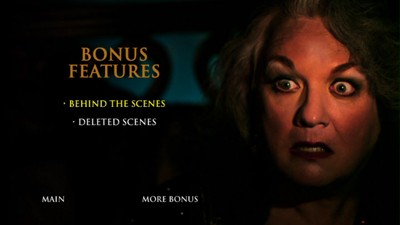 |
Video and Audio:
The digital photography of Tales of Poe exhibits the tell-tale signs of independent cinematography, showcasing the candidness and clarity of budget-conscious digital footage. The 1.85:1-framed transfer relishes opportunities across the board for vivid and atmospheric shades of color: ruby-red lipstick and sterile greens and tans in "Tell-Tale Heart"; neon-infused lights and shadowy bricks in "The Cask"; multihued fluids, boldly colored garments, and oranges and yellows in both translucent drapes and lightbulb filaments in "Dreams". Skin tones are warm or cool as the setting requires, with gradation that looks nice depending on the paleness or strength of the actor's complexion. Digital smoothness and noise crop up in many different scenes of varying light temperatures, but other scenes featuring blood spatter and textured masks reveal the other side of the discs. It's a mixed bag for the indie film, but it functions.
The Dolby Digital 2.0 track is equally as perfunctory, preserving the film's atmospheric intentions in ways that are both noteworthy and forgettable. Dialogue remains discernible throughout, especially during the overarching voiceovers, while other scenes that take place in specific environments -- cramped bedrooms and echoic wine cellars -- respond to the confines with plenty of responsive personality. There are some pretty fierce sound effects, too, from the ripping of flesh to the fierce thump of tap-dancing feet, which hit the mid-range clarity and lower-end support bass fairly well. No harsh distortion or hiccups to report, just a front-loaded presentation.
Special Features:
Extras include exactly ten minutes of raw Behind the Scenes (10:00, 16x9) footage that bounces between scenes from "The Cask" and "Dreams", as well as a series of Deleted Scenes (11:16, 16x9) and a short audio-only Interview with Bart Mastronardi (5:45, 16x9) accompanied by stills from the production. A Kickstarter Campaign Trailer (4:09, 16x9) and Original Trailer (2:17, 16x9 HD) have also been included.
Final Thoughts:
Other short screen adaptations of Edgar Allan Poe's works -- such as Jules Dassin's Tell-Tale Heart and the American Masters version of "The Cask of Amontillado", starring John Heard -- are worth seeking out and relishing before flipping through the Tales of Poe, an indie anthology project featuring modified adaptations of the author's material. As they appear here, the tweaks in story and tone render slightly macabre, yet unconvincing and frustrating reimagining of the material, where additions drain the stories of some of their mystique and straightforward effectiveness. The performances might be sturdy and clever in spots, but it's not enough to overcome the oddities of these homages, which also lack immersive atmosphere and genuine scares. Barely worth a Rental for its indie gumption, off-and-on performances, and plucky production design.
|
| Popular Reviews |
| Sponsored Links |
|
|
| Sponsored Links |
|
|
| Release List | Reviews | Shop | Newsletter | Forum | DVD Giveaways | Blu-Ray | Advertise |
|
Copyright 2024 DVDTalk.com All Rights Reserved. Legal Info, Privacy Policy, Terms of Use,
Manage Preferences,
Your Privacy Choices | |||||||









